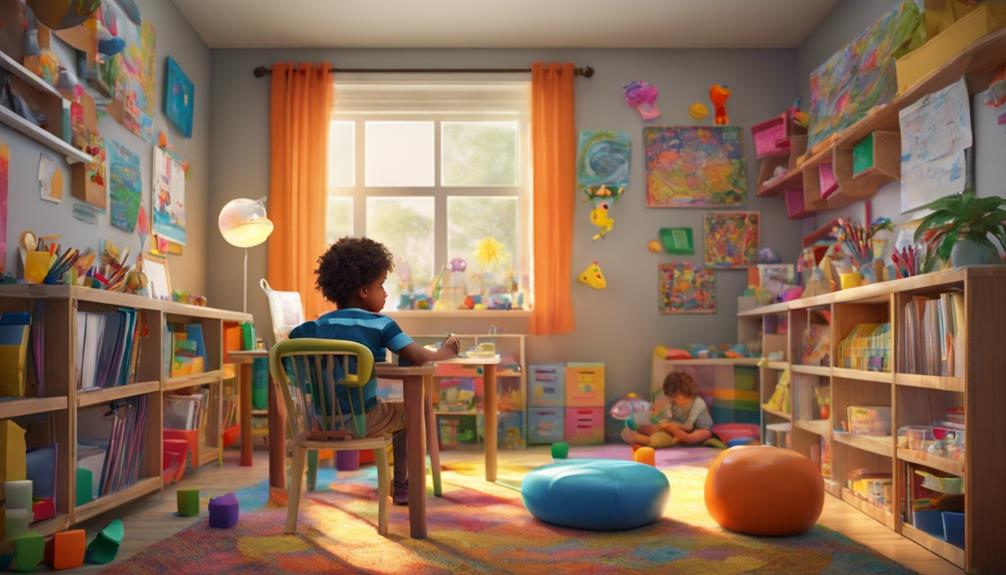Dividing assets during a divorce where children are involved is akin to delicately untangling a knot made up of both material belongings and sentimental attachments.
As parents facing this intricate process, we understand the complexities that arise when trying to ensure a fair and thoughtful split while keeping our children's well-being at the forefront.
The intricacies of balancing financial considerations and emotional sensitivities can be daunting, but by approaching this journey with a focus on our children's stability and happiness, we can strive to find a resolution that serves everyone involved.
Key Takeaways
- Prioritize children's needs and preferences in asset division for stability.
- Understand Texas laws on property division to ensure fairness for children.
- Factor in children's possessions and well-being for equitable asset allocation.
- Seek legal guidance to navigate custody and financial decisions effectively.
Factors to Consider Before Asset Splitting
Before we delve into the asset splitting process, it's crucial to take into account several key factors that can significantly impact the well-being of the children involved in the divorce. Considering the child's needs is paramount in this situation. Their preferences regarding their belongings should also be carefully considered during the asset splitting process. It's essential to ensure that children's belongings contribute to their stability and sense of security during this challenging time.
Moreover, maintaining a stable environment for the child with minimal disruptions is vital for their well-being. Involving children in decisions about their possessions can promote independence and stability, empowering them to have a say in their own lives. By prioritizing the child's interests and promoting a sense of control over their belongings, we can help them navigate this difficult period with more confidence and security. Making thoughtful decisions regarding asset splitting not only addresses financial aspects but also plays a crucial role in safeguarding the emotional welfare of the children.
Legal Guidelines for Dividing Assets

Navigating the legal guidelines for dividing assets in a divorce can be a complex yet crucial aspect of ensuring a fair and equitable distribution of property.
In Texas, where marital property is divided fairly in divorce proceedings, the goal is initially an equal split of community property. However, adjustments based on fairness factors may result in an uneven split.
Distinguishing between separate property and community property is vital; separate property remains with the original owner, while community property is divided equally.
Judges have discretion to ensure a fair division, taking into account various circumstances that may warrant an uneven split. Seeking legal guidance is essential to accurately identify community-property assets and navigate Texas's asset division laws.
Impact of Children on Asset Division
Considering the impact children have on asset division during a divorce, it is crucial to carefully assess the inclusion of their belongings in the distribution process. Dividing children's assets involves more than just physical items; it entails recognizing the financial implications and ensuring fairness for all parties involved. Parents may face challenges such as sharing items, compensating for duplicates, or covering replacement costs. These factors can add financial strain and emotional complexity to an already difficult situation. Planning ahead and discussing how to handle children's possessions can help alleviate some of these burdens. Fairness should be a guiding principle in this process, ensuring that each parent receives an equitable share of the children's belongings. Below is a table summarizing key considerations when dividing children's assets:
| Key Considerations | Description |
|---|---|
| Sharing Items | Determine how to divide children's possessions fairly between both parents. |
| Compensation | Consider compensating one parent for duplicate items or significant costs. |
| Replacement Costs | Address the expenses associated with replacing items that stay with one parent. |
Strategies for Fair Asset Allocation

Strategically assessing the children's needs and well-being is paramount when devising a plan for the equitable distribution of assets following a divorce. It's crucial to consider their emotional stability and sense of security during this challenging time. Working together with your ex-spouse to ensure the children's best interests are met can lead to a more harmonious asset allocation process.
- Consult a Divorce Attorney: Seeking legal advice can provide clarity on property rights and help navigate the complexities of dividing assets, especially when children are involved.
- Prioritize Child Custody: When determining asset allocation, keep the children's custody arrangements at the forefront to guarantee their living situation remains stable and secure.
- Consider Family Law Mediation: Engaging in mediation can assist in facilitating discussions with your ex-spouse regarding asset division, promoting a more cooperative and child-centered approach.
Navigating Custody and Financial Decisions
When making decisions about custody and finances during a divorce, it's crucial to carefully assess the impact on child support payments and health insurance costs for the children. Child custody arrangements play a significant role in determining child support obligations, making it essential to consider these financial implications when planning custody agreements.
Health insurance costs for the children should also be factored into the financial planning process to ensure their well-being is adequately covered. By navigating custody and financial decisions thoughtfully, you can avoid potential financial strain on either parent post-divorce.
It's important to prioritize the current and future financial needs of your children when dividing marital assets and establishing support arrangements. Seeking legal advice to create a comprehensive settlement agreement that addresses child custody, support, and financial planning can help streamline the divorce process and minimize conflicts down the road.
Frequently Asked Questions
How Do You Deal With Separation When a Child Is Involved?
When a child is involved in a separation, we prioritize their well-being. Communication and cooperation are key. Understanding the financial implications and emotional attachments to belongings guides fair asset splitting decisions. Planning ahead avoids conflicts.
What Not to Say to Kids During Divorce?
During divorce, we should avoid sharing financial or legal details with kids to shield them from stress. Refrain from blaming the other parent or involving children in adult conflicts to protect their emotional well-being.
How Do You Get Over a Divorce When You Have Kids?
We focus on healing by prioritizing our children's well-being, seeking support from loved ones, and following court orders for a smoother transition post-divorce. Communication with our ex-spouse and professional legal guidance also play vital roles.
What's the Hardest Age for Children to See Their Parents Split?
When parents split, children aged 9-12 may struggle the most due to their developmental stage. They face guilt, confusion, and fear, needing extra support to adjust. Providing stability and reassurance can help them navigate divorce challenges.
Conclusion
As we navigate the intricate process of dividing assets during a divorce, let's remember that children's belongings hold a special place in their hearts.
Like pieces of a puzzle, each item plays a vital role in their daily lives, creating a sense of stability and comfort.
Let's handle these possessions with care, like delicate threads in a tapestry, weaving together the fabric of our children's well-being post-divorce.










